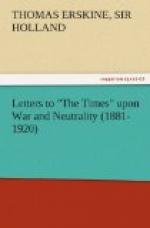In the furthering of these objects of national interest and concern you are performing an important part. This exposition would have touched the heart of that American statesman whose mind was ever alert and thought ever constant for a larger commerce and a truer fraternity of the republics of the new world. His broad American spirit is felt and manifested here. He needs no identification to an assemblage of Americans anywhere, for the name of Blaine is inseparably associated with the Pan-American movement, which finds this practical and substantial expression, and which we all hope will be firmly advanced by the Pan-American congress that assembles this autumn in the capital of Mexico. The good work will go on. It cannot be stopped. These buildings will disappear; this creation of art and beauty and industry will perish from sight, but their influence will remain to
Make it live beyond its too short living
With praises and thanksgiving.
Who can tell the new thoughts that have been awakened, the ambitions fired and the high achievements that will be wrought through this exposition? Gentlemen, let us ever remember that our interest is in concord, not conflict, and that our real eminence rests in the victories of peace, not those of war. We hope that all who are represented here may be moved to higher and nobler effort for their own and the world’s good, and that out of this city may come, not only greater commerce and trade, but more essential than these, relations of mutual respect, confidence and friendship which will deepen and endure.
Our earnest prayer is that God will graciously vouchsafe prosperity, happiness and peace to all our neighbors, and like blessings to all the peoples and powers of earth.
DEATH OF PRESIDENT McKINLEY.
ANNOUNCEMENT OF THE ASSASSINATION.
Buffalo, N.Y., Sept. 6-7 P.M.
The President was shot about 4 o’clock. One bullet struck him on the upper portion of the breastbone, glancing and not penetrating; the second bullet penetrated the abdomen five inches below the left nipple and one and a half inches to the left of the median line. The abdomen was opened through the line of the bullet wound. It was found that the bullet had penetrated the stomach. The opening




